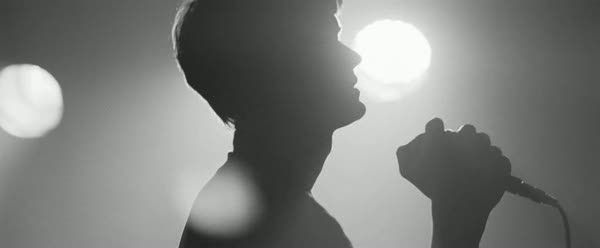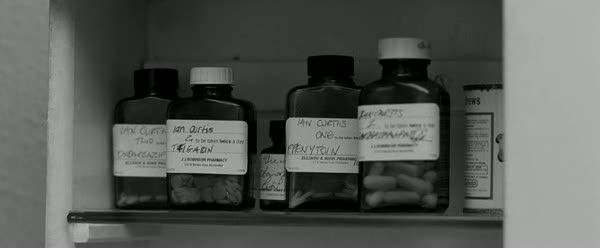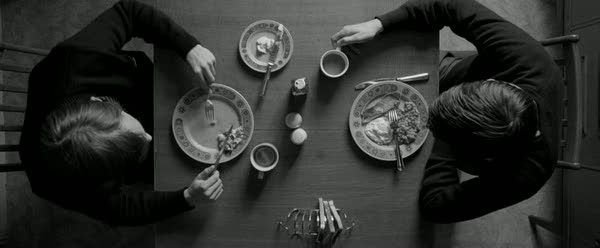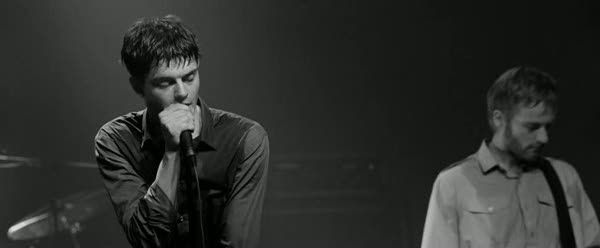
One of the most influential bands to come out of the 1970s post-punk movement was Manchester's Joy Division. Their sound - dark, looming, ethereal, sinister and sad - went on to influence bands in the 80s, 90s and now, the post-punk revival of the 00s and 10s. You can still detect traces of Joy Division's sound in recent bands such as Interpol, The Editors or The National, or even recenter stuff like Miike Snow.
Control is a biopic of Joy Division's lead singer, Ian Curtis, who would commit suicide in 1980 at the age of 23. (Following Curtis's death, the remaining members formed New Order - another titan in the post-punk pantheon.) Curtis, played by Sam Riley as an inscrutable, brooding, quiet young man, is also the spark and life of Joy Division.

Great cinematography.

Not drugs, just meds.

Sometimes 1984-ish.
This isn't a typical rockstar biopic featuring "sex, drugs and..." - Curtis and his bandmates (James Anthony Pearson, Joe Anderson and Andrew Sheridan) are too thoughtful and sober for that. Director Anton Corbijn even plays on this cliché in one sequence where Curtis is shown walking down the street wearing a large black coat with "HATE" scrawled on the back. After moodily smoking a cigarette, he enters the Employment Office - only he's not going to pick up his weekly unemployment benefit, he's going to work. Indeed, Curtis is a bureaucratic drone, and his private life is likewise conservative: he married his high school sweetheart (Samantha Morton) at 19 and was a father by 22. His creative interests - we see influences of David Bowie, the Sex Pistols, and William Wordsworth - are channeled into Joy Division's lyrics, and everything seems great for a while as he runs his life during the day and has some fun singing gigs at night.
But then he starts to "lose control", and so begins his slide into depression and helplessness. Coming back from their first London gig, Curtis experiences a seizure. He is diagnosed with epilepsy and given a long list of medications to take, all which have their nasty side effects. The band takes off, and suddenly more energy, passion and commitment are demanded of him. He unexpectedly falls in love with a Belgian journalist, Annik Honoré (Alexandra Maria Lara), and his marriage becomes strained.

Off to the office.

The performance scenes were great - and eerie, when you compare them to the real thing.
Most people's lives don't fit into the standard heroic quest pattern, and director Corbijn doesn't bother with trying to force Curtis' into that narrative mold. Nor does he intend to explain him or his suicide. The film has only one instance of background music, and that too lasting only a few seconds, so there is no emotional hand-holding. Instead, Corbijn intersperses the biographical scenes with Joy Division songs. This is a wise choice, since the lyrics are probably the best window we have into his states of mind. For example, in one sequence, after Curtis has just learned of his epilepsy, he calls to check up on a young epileptic girl whom he helped get a job for - and discovers that she had been fired for having a seizure at work. This later fades into the recording and performance of She's Lost Control.
We think this film, which is ponderous and ambiguous, may have limited appeal. This is a shame; it's a good movie. It's also technically impressive since the actors perform the songs, and do it remarkably well. But if you like Joy Division, or want to learn more about them, this will be very rewarding.


2 comments:
I love this movie - I was a big Joy Division fan and one of my biggest disappointments was never seeing them live, as I only moved to England in 1984. I think the story is so simply told with so many nods to what was happening in the UK at the time. The depression oozes from some frames, and yet there was still so much joy, which I think he manages to depict in many of the scenes.
Love it - think everyone should see it.
This movie is ambiguous, in that its Ian Curtis is the confused, driven, and not wholly admirable person that is portrayed in Deborah Curtis's book Touching from a Distance. The scene where Annik insists that she and Ian have a conversation instead of jumping into bed together, and he can't think of anything to say, is painfully awkward (but rings true for that reason).
What made the movie so compelling for me were the actors' performances of Joy Division's music, which are uncanny in their recreation of the band's look and sound, and are very raw and powerful (very much like the band's appearance on Something Else in September 1979). Sam Riley and Samantha Morton are also excellent as Ian and Deborah, and the whole look and feel of the film is very evocative of the time (and is based on Corbijn's own grainy black-and-white photos of the band).
No, it's not a standard rock biopic, but then Joy Division was not a standard rock band.
Post a Comment